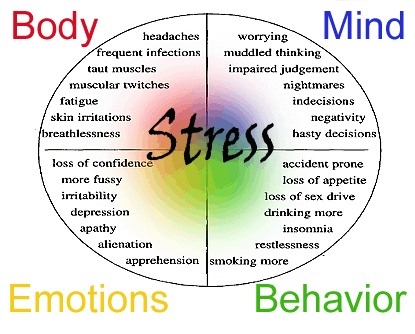Stress

Symptoms of stress
Stress can manifest as various symptoms affecting one's body, mind, behavior, and/or emotions.
Negative or overwhelming work experiences can cause a person substantial distress. Burnout, depression, and psychosomatic disorders are particularly common outcomes of work-related stress. In general, individual distress manifests in three basic forms: psychological disorders, medical illnesses, and behavioral problems.
Psychological Disorders
Psychosomatic disorders are a type of psychological disorder. They are physical problems with a psychological cause. For example, a person who is extremely anxious about public speaking might feel extremely nauseated or may find themselves unable to speak at all when faced with the prospect of presenting in front of a group. Since stress of this type is often difficult to notice, managers would benefit from carefully monitoring employee behavior for indications of discomfort or stress.
Medical Illnesses
Physiological reactions to stress can have a long-term impact on physical health. In fact, stress is one of the leading precursors to long-term health issues. Backaches, stroke, heart disease, and peptic ulcers are just a few physical ailments that can arise when a person is under too much stress.
Behavioral Problems
A person can also exhibit behavioral problems when under stress, such as aggression, substance abuse, absenteeism, poor decision making, lack of creativity, or even sabotage. A stressed worker may neglect their duties, impeding workflows and processes so that the broader organization slows down and loses time and money. Managers should keep an eye out for such behaviors as possible indicators of workplace stress.
Organizational Effects of Stress
Stress in the workplace can be, so to speak, "contagious"—low job satisfaction is often something employees will discuss with one another. If stress is not noted and addressed by management early on, team dynamics can erode, hurting the social and cultural synergies present in the organization. Ultimately, the aggressive mentality will be difficult to remedy.
Managers are in a unique position when it comes to workplace stress. As they are responsible for setting the pace, assigning tasks, and fostering the social customs that govern the work group, management must be aware of the repercussions of mismanaging and inducing stress. Managers should consistently discuss job satisfaction and professional and personal health with each of their subordinates one on one.